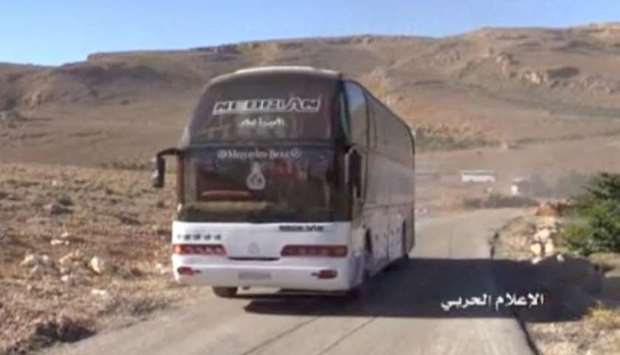Some 7,000 Syrians including 1,000 militants, their families and refugees are to leave the Lebanese town of Arsal and the surrounding border area and head for Syria's northwestern Idlib province under the deal, Hezbollah-run media outlets said.
The transfer echoes deals struck within Syria in which Damascus has shuttled rebels and civilians to Idlib and other opposition areas. Such evacuations have helped President Bashar al-Assad recapture several rebel bastions over the past year, and are criticised by the opposition as amounting to the forced transfer of populations seen as sympathetic to the opposition.
The ceasefire took effect last week, just days after Lebanese Hezbollah and the Syrian army launched an offensive to drive Nusra Front and other Sunni Muslim militants from their last foothold along the Syria-Lebanon border.
The operation has highlighted the major role of Hezbollah in fighting militants along the frontier during Syria's six-year war, part of the much bigger role it has played across Syria in support of Assad.
Hezbollah's Al Manar television said that 113 buses had begun leaving Arsal town, headed for Fleita on the Syrian side.
At least 26 buses earlier left refugee camps in the nearby Jroud Arsal area and crossed to Wadi Hmeid further northeast in the direction of the Syrian frontier, it said, before their onward journey to Idlib.
Aid agencies with limited access to Arsal were not able to say where many of the Syrian refugees living in the area had originally come from.
The deal included the release of eight Hezbollah fighters by the Nusra Front in exchange for individuals held by Lebanon. Three of the Hezbollah fighters were released overnight. The remaining five are expected to be released once the first convoy reaches its destination in Syria.
Last week, Hezbollah captured most of the mountainous zone of Jroud Arsal from the militants.
The Nusra Front was al Qaeda's Syria branch until it severed ties and rebranded last year. It now spearheads the Tahrir al-Sham Islamist alliance in the Syrian civil war.
Hezbollah role
The Lebanese army, which receives considerable US and British military support, did not take an active part in the operation, setting up defensive positions around Arsal.
The next phase is expected to focus on a nearby enclave currently in the hands of Islamic State jihadists. Local media say the Lebanese army will likely wage that phase of the operation.
Hezbollah's role in Syria's conflict has been criticised by its Lebanese political opponents, including Prime Minister Saad al-Hariri, who is a Sunni.
Iran-backed Hezbollah, which has lost hundreds of fighters in Syria, says its fight is an existential one to stop extremists spreading to Lebanon. Its Lebanese critics say it has fuelled militant attacks in Lebanon.
The Arsal region witnessed one of the most serious spillovers of the Syrian civil war into Lebanon when Nusra Front and Islamic State militants briefly overran the town of Arsal in 2014, abducting dozens of Lebanese soldiers and policemen.
Islamic State is still holding nine Lebanese soldiers captured at that time. Their fate is unknown.

